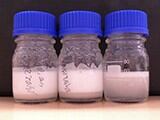If pathogens – read bacteria, yeasts or other microorganisms – enter beer during brewing this can result in strong taste and smell variations – the drink can become cloudy, sour and unwholesome.
Beverage manufacturers can also shorten testing times for drinks such as milk, juice, cola and red wine; Fraunhofer said that, in the case of beer, conventional microbiological testing methods take 5-7 days to detect organisms such as bacteria and yeasts.

Working with German food analysis company GEN-IAL, Fraunhofer Institute for Applied Polymer Research IAP researchers have developed the polymer powder to significantly simplify the tests and shorten the time they take.
Significantly shorter testing times
Fraunhofer said that the new test brings results in 2-3 days – shortening the process by replacing the conventional process whereby beer is filtered and bacteria left on a membrane have to be cultivated in a medium, then examined microscopically.
The new polymer power from the IAP replaces this process – 100-200µ (micron/micrometer – one thousandth of a millimetre) sized powder particles have a ‘functionalized’ surface that binds to bacteria – once added to the liquid sample – and are easily removed with the microbes in a specially developed system prior to analysis.
Thus, the time-consuming enrichment phase using a nutrient medium is no longer necessary, while food safety experts can investigate pathogen levels in other beverages, which Fraunhofer experts said was hardly possible using traditional membrane filtration.
Fruit juice, milk, cola and red wine can also be tested
Dr Andreas Hollander, scientist at IAP, said: “Membrane filtration is not suitable for the quality control of beverages such as fruit juices, milk, cola and red wine.
“They contain so much solid or suspended matter that the filter clogs quickly,” he added.
Until now breweries have only been able to examine small sample volumes of up to one liter via membrane filtration – with the new polymer powder tests with 30+ liters are possible.
“Wherever a small amount of microbes has to be extracted from a large amount of liquid, the new technique can be useful,” Hollander said.
Dr Jutta Schonling, MD of GEN-IAL, added: “Through the use of the powder food safety is increased, since it is more likely to find trace contaminants in large volumes of the beverages.”
IAP has developed equipment to prepare or ‘functionalize’ the powder that GEN-IAL is now using this for pilot production; customers will be able to buy the powder this spring.
